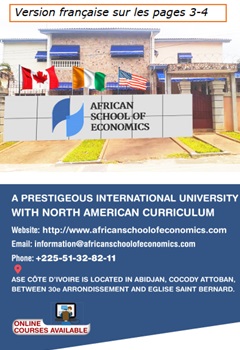This post is also available in:

Prof. Leonard Wantchekon, Founder and President
Economic development results, at least in part, from the development of innovative economic ideas. The process of generating these ideas is invariably endogenous, and mostly homegrown. Africa is no different. Debates over the soundness of economic policy, the role of institutions, and the impact of development interventions need to incorporate more highly trained African researchers. To this end, the African School of Economics strives to provide young researchers with not only rigorous methodological training, but also with the opportunity to actively apply this training to current social problems via close collaborations with government agencies, international organizations, and businesses. The university’s multi-disciplinary curricula, intertwining modern economic thought with African history, enables students to gain a dynamic understanding of the processes and events that shape and continue to shape development across the continent. We hope that the combination of this training, paired with ASE’s open, collaborative research environment, will leave students with the necessary skills and strong commitment to join a community of scholars actively contributing to the exchange of knowledge regarding African development.
To achieve the goals mentioned above, ASE has identified three primary pillars on which to center its activities. First, the university aims to provide students with rigorous methodological and historical training. Across all of our master’s programs, students are required to take core courses in Microeconomics, Macroeconomics, Econometrics, Mathematics, Applied Statistics, Software, and African Economic History. Students also have the opportunity to choose from a wide range of elective courses spanning topics such as Political Economy, African Art History, and Entrepreneurship and Private Sector Development, to name a few.
This well-rounded curriculum is designed to enable students to actively contribute to ASE’s second pillar: a vibrant research community. Students at ASE have the opportunity to develop their research skills by contributing to ASE’s many research institutions, including the Institute for Empirical Research in Political Economy (IERPE), the Institute for Finance and Management (IFM), the Development Research Lab (DRL), the Institute for African Studies (IAS), and the Institute of Biotechnology and Agriculture Science (IBSA). Together, these institutions produce cutting-edge research on topics including political economy and governance, financial and private sector development, the role of technology in promoting development, and agricultural production.
Third, ASE aims to foster a strong sense of social responsibility among it students, faculty, and scholars. We encourage students to think about ways in which the research tools they strengthen through coursework and research opportunities can be applied to pressing development concerns facing African countries and the world, For instance, ASE students are currently involved in the Benin Math Project, a nationwide math tutoring program set up in collaboration with Animath, a French Education NGO with the goal of improving the quality of mathematics instruction and enhancing student interest in the subject. Further, the Development Research Lab and the Institute of Biotechnology and Agricultural Science are tackling problems such as financial inclusion and food security by seeking technological solutions to improve investment and agricultural productivity.
Overall, ASE is not only about generating cutting edge knowledge, but it is also about testing ideas to promote the creative use of this knowledge. ASE is already fulfilling its mission after only 3 years of operation. In addition to the direct contributions mentioned above, the university places students in top international Ph.D. programs such as Princeton, NYU and Illinois, international organizations such as the World Bank, Food and Agriculture Organization (FAO), and various government agencies after graduation. We hope that this increased engagement will give a greater voice to African researchers and entrepreneurs in the debate over the continent’s development.

